Discover 15 hidden attractions, cool sights, and unusual things to do in Athens (United States). Don't miss out on these must-see attractions: Sanford Stadium, Georgia Theatre, and The State Botanical Garden of Georgia. Also, be sure to include Hill First Baptist Church in your itinerary.
Below, you can find the list of the most amazing places you should visit in Athens (Georgia).
Table of Contents
Sanford Stadium

Stadium in Athens, Georgia. Sanford Stadium is the on-campus playing venue for football at the University of Georgia in Athens, Georgia, United States. The 92,746-seat stadium is the tenth-largest stadium in the NCAA. Architecturally, the stadium is known for its numerous expansions over the years that have been carefully planned to fit with the existing look of the stadium. The view of Georgia's campus and rolling hills from the open west end-zone has led many to refer to Sanford Stadium as college football's "most beautiful on-campus stadium", while the surrounding pageantry has made it noteworthy as one of college football's "best, loudest, and most intimidating atmospheres". Games played there are said to be played "between the hedges" due to the field being surrounded by privet hedges, which have been a part of the design of the stadium since it opened in 1929. The current hedges were planted in 1996 after the originals were taken out to accommodate soccer tournament for the 1996 Summer Olympics.
The stadium is the 9th largest stadium in the United States and the 17th-largest such stadium in the world. Unlike most stadiums that have artificial playing surfaces, Sanford Stadium from the outset had, and continues to have, a natural grass surface, planted with Tifton 419 Bermuda Grass.[1]
Address: 110 Field Ave, 30606-3675 Athens
Georgia Theatre
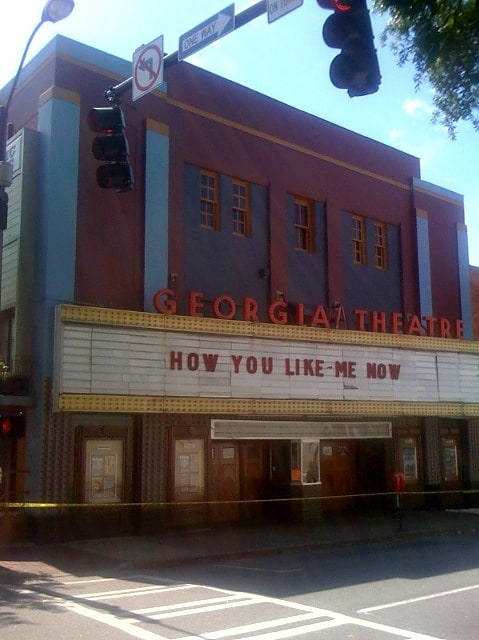
Music venue in Athens, Georgia. Georgia Theatre is a live music venue and event space in Athens, Georgia. Many prominent national and local acts across all genres have performed at the Theatre, including rock, folk, country, indie, alternative, hip hop and electronic. The venue is on the Athens Music History Walking Tour sponsored by the Athens Convention and Visitors Bureau. Georgia Theatre opened as a music venue in 1978, but spent a few years in the early 1980s operating sporadically as a movie house. It was reopened as a music venue in 1989 and has since hosted many of the major touring acts that come through the state.[2]
Address: Athens, 215 N. Lumpkin Street
The State Botanical Garden of Georgia
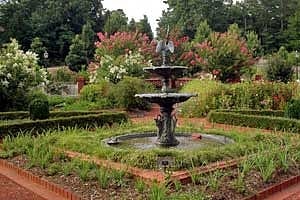
Public plant collections and nature trails. The State Botanical Garden of Georgia is a botanical garden of 313 acres in the United States, with a conservatory operated by the University of Georgia. It is located at 2450 South Milledge Avenue, Athens, Georgia.
The Garden contains eleven botanical and horticultural collections:
- Annual/Perennial Garden - annuals and perennials
- Dahlia Garden (1987) - dahlias
- Groundcover Collection - bugleflower, euonymus, hypericum, ivy, juniper, liriope, ophiopogon, thrift, vinca, etc.
- Heritage Garden - plants of historic and social interest to Georgia, including apples, pears, and peaches, cotton, peanuts, and tobacco.
- International Garden - Middle Ages (Herb Garden and Physic Garden), Age of Exploration (Mediterranean & Middle East, Spanish America, American South, and China sections), and Age of Conservation (American Indian Plants, Bog Garden, Threatened & Endangered Plants).
- Native Azalea Collection - azaleas
- Native Flora Garden - more than 300 species, including ferns, trilliums, bloodroot, and lady slipper orchids.
- Rhododendron Collection (1976) - rhododendrons
- Flower Garden - Brand new in 2008.
- Shade Garden - azalea, camellia, dogwood, laurel, magnolia, redbud, and viburnum.
- Trial Garden - shrubs and trees under evaluation for the southeastern United States.
It also contains about 5 miles (8.0 km) of nature trails.
In 1984, it received the designation as Georgia's "State Botanical Garden".[3]
Address: 2450 S Milledge Ave, 30605 Athens
Hill First Baptist Church
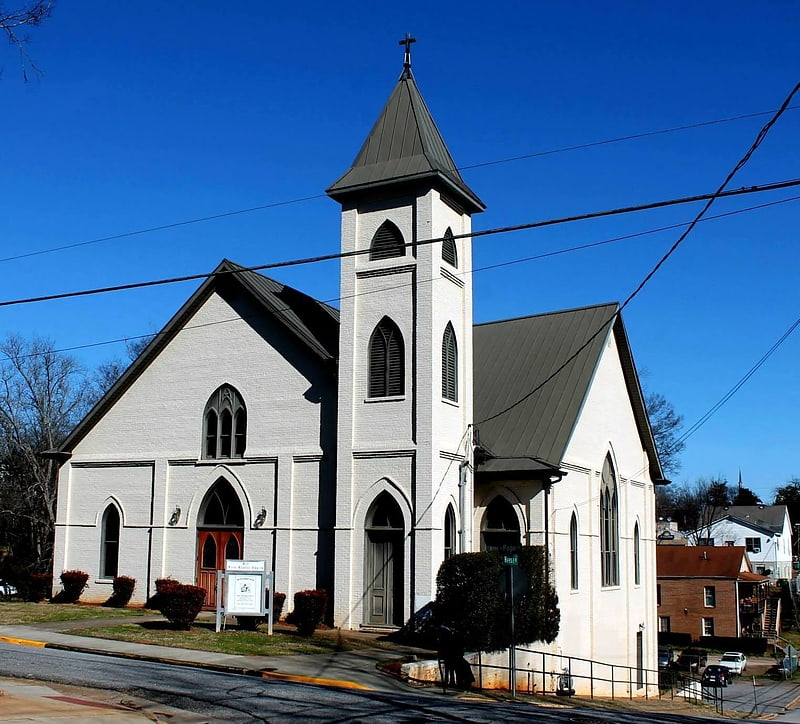
Baptist church in Athens, Georgia. Hill First Baptist Church "is the oldest African American church in the Athens, Georgia community". It is a contributing property to the Reese Street Historic District.[4]
Ware–Lyndon House
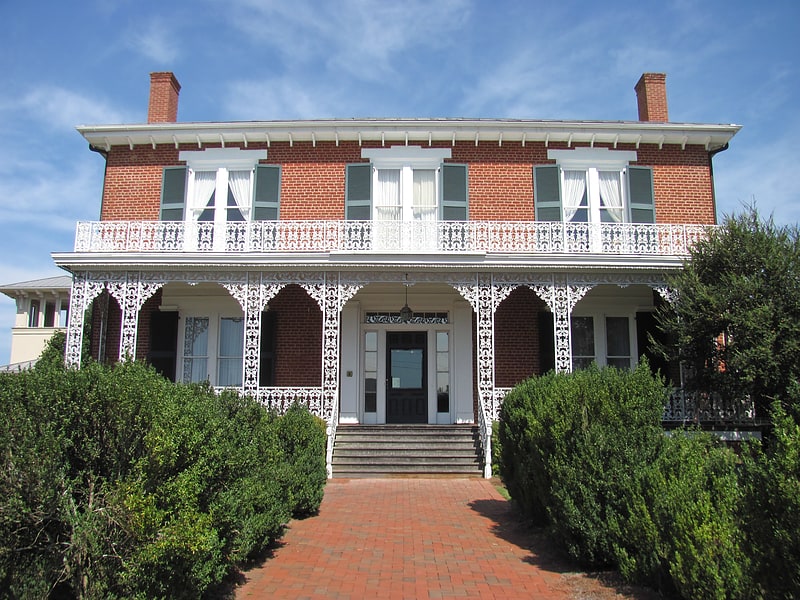
The Ware–Lyndon House is a historic house located at 211 Hoyt Street in Athens, Georgia, at the end of Jackson Street. Built circa 1850, the house is two stories and exhibits an Italianate style. Edward R. Ware, its original owner, sold the property to Edward S. Lyndon in 1880. In 1939, the city of Athens purchased the home and a major restoration was made in 1960. In 1976, it was placed on the National Register of Historic Places. It is the only surviving structure from the Lickskillet neighborhood of Athens, one of the most fashionable districts of its time.[5]
Address: 293 Hoyt St, 30601-2648 Athens (Downtown Athens)
Jackson Street Cemetery
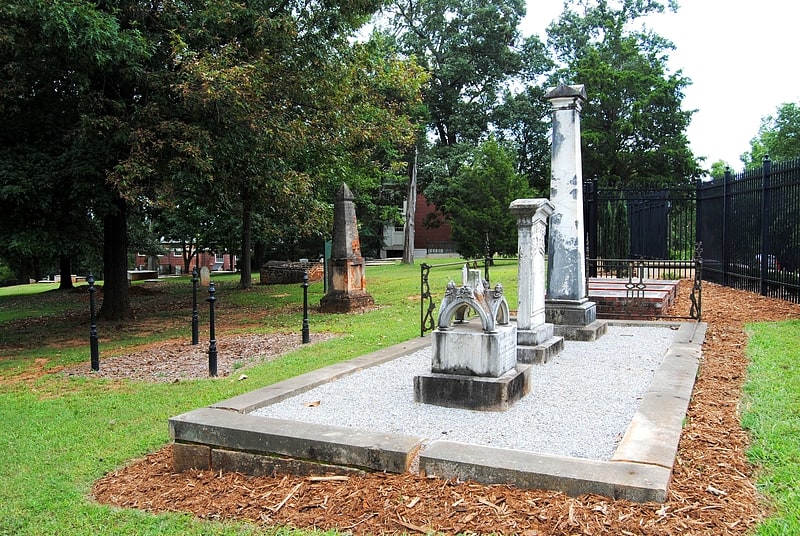
Cemetery in Athens, Georgia. Jackson Street Cemetery, also known as Old Athens Cemetery, was the original cemetery for Athens, Georgia and is listed on the National Register of Historic Places. It was in official use as the town cemetery from about 1810 to 1856, until Oconee Hill Cemetery opened. The last known burial was in 1898.[6]
The Tree That Owns Itself
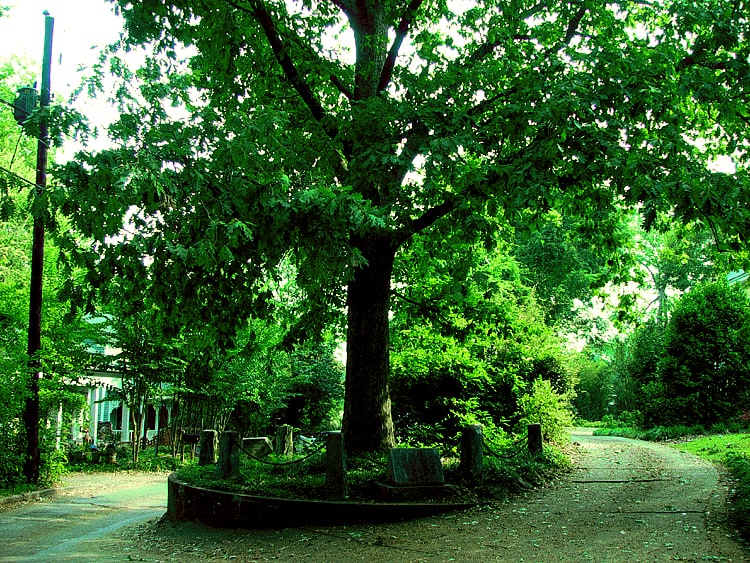
Historical place in Athens, Georgia. The Tree That Owns Itself is a white oak tree that, according to legend, has legal ownership of itself and of all land within eight feet of its base. Also known as the Jackson Oak, the tree is at the corner of South Finley and Dearing Streets in Athens, Georgia, US. The original tree, thought to have started life between the mid-16th and late 18th century, fell in 1942, but a new tree was grown from one of its acorns and planted in the same location. The current tree is sometimes referred to as the Son of the Tree That Owns Itself. Both trees have appeared in numerous national publications, and the site is a local landmark.[7]
Address: S Finley St., 30605 Athens
Athens Welcome Center - Classic City Tours
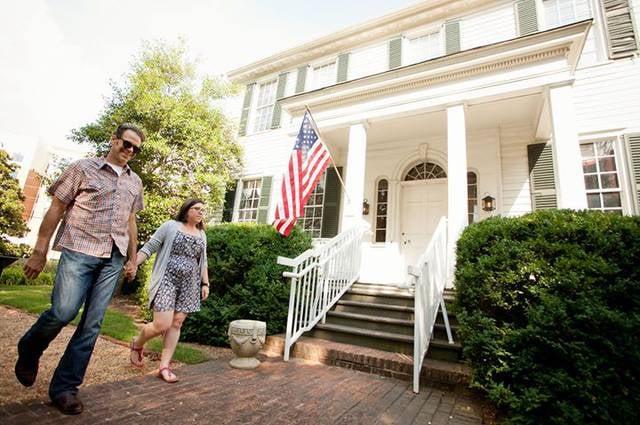
Museum, Visitor center
Address: 280 E Dougherty St, 30601-2611 Athens (Downtown Athens)
T. R. R. Cobb House
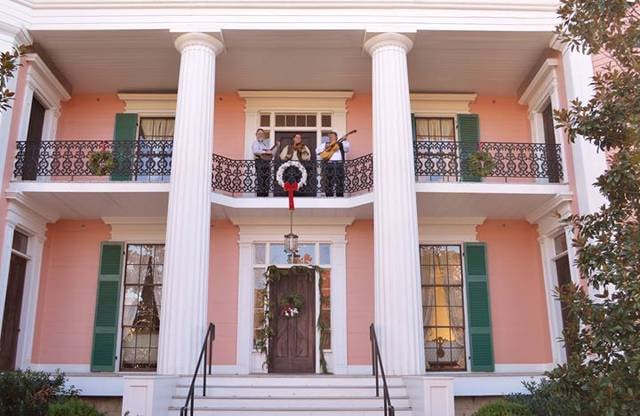
Museum in Athens, Georgia. The T. R. R. Cobb House built in 1842 is an historic octagon house originally located at 194 Prince Avenue in Athens, Georgia. On June 30, 1975, it was added to the National Register of Historic Places.
The original part of the home of Thomas Reade Rootes Cobb is a Greek Revival four-over-four "Plantation Plain" built about 1834. The house given in 1844 to Cobb and his new wife, Marion Lumpkin, as a gift from his father-in-law, Joseph Henry Lumpkin, the first Chief Justice of the Georgia Supreme Court. Cobb made additions to the house of new rooms, and by 1852, it had acquired its octagon shape and two-story portico. Cobb died in 1862, and his widow remained in the house until 1873 when she sold it. The house was maintained and the Cobb family was served by the two dozen enslaved people Cobb owned, who lived behind the main house.
Until 1962, the house was used for a variety of purposes including rental property, a fraternity house, and a boarding house. In 1962, the Archdiocese of Atlanta bought the house to use as the rectory and offices for St. Joseph Catholic Church. In the 1980s, the parish was planning to demolish the house, and the Stone Mountain Memorial Association stepped forward in 1984, bought it, and relocated it to Stone Mountain Park in 1985.
The restoration of the house never took place because of lack of funding, and the house sat for nearly twenty years. In 2004 the Watson-Brown Foundation bought the house and returned it to Athens in the spring of 2005. The Watson-Brown Foundation restored the house to its appearance of 1850; in 2008, the Georgia Trust gave their work its Preservation Award for excellence in restoration.
The house was delisted from the National Register in 1985, but was re-listed on July 23, 2013.
The house is now open as a house museum located at 175 Hill Street in Cobbham Historic District. The same foundation also operates other historic house museums in Georgia including Hickory Hill in Thomson and the May Patterson Goodrum House in Atlanta.[8]
Address: 175 Hill St, 30601-2419 Athens
Double-barreled cannon
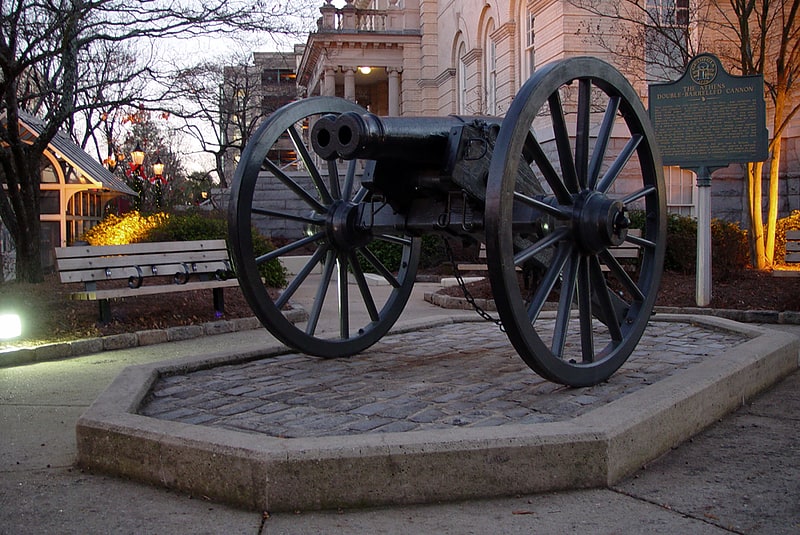
Tourist attraction in Athens, Georgia. The double-barreled cannon is an American Civil War-era experimental weapon and is now a modern landmark located in Athens, Georgia. While originally built for warfare, the cannon never saw battle.[9]
Address: 301 College Ave, 30601-2715 Athens (Downtown Athens)
Morton Theatre
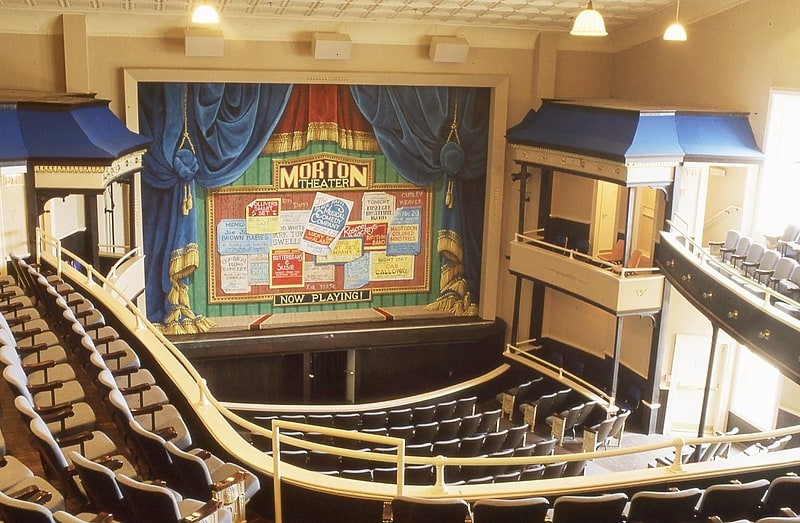
Theatre in Athens, Georgia. The Morton Theatre, located in downtown Athens, Georgia, at 195 West Washington Street, is one of the first vaudeville theatres in the United States uniquely built, owned, and operated by an African-American businessman: Monroe Morton. In 2001, its location was termed Athens' "Hot Corner". The Theatre currently operates as a rental facility that hosts a wide range of dramatic, musical, and dance performances as well as special events.[10]
Address: 195 W Washington St, 30601-2752 Athens (Downtown Athens)
Henry W. Grady House
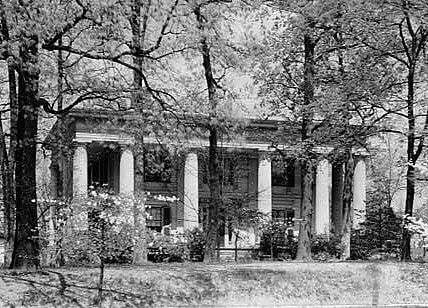
Museum in Athens, Georgia. The Taylor-Grady House, also known as the Henry W. Grady House, is a historic house museum and National Historic Landmark at 634 Prince Avenue in Athens, Georgia, United States. Built in the 1840s, this Greek Revival house is notable as the only known surviving home of Henry W. Grady, managing editor of the Atlanta Constitution and a leading force in the reintegration of the American South in the Reconstruction Era that followed the American Civil War. The house is operated by the Junior League of Athens, which offers tours and rentals for private events.[11]
Address: 634 Prince Ave, 30601-2453 Athens
Oconee Hill Cemetery
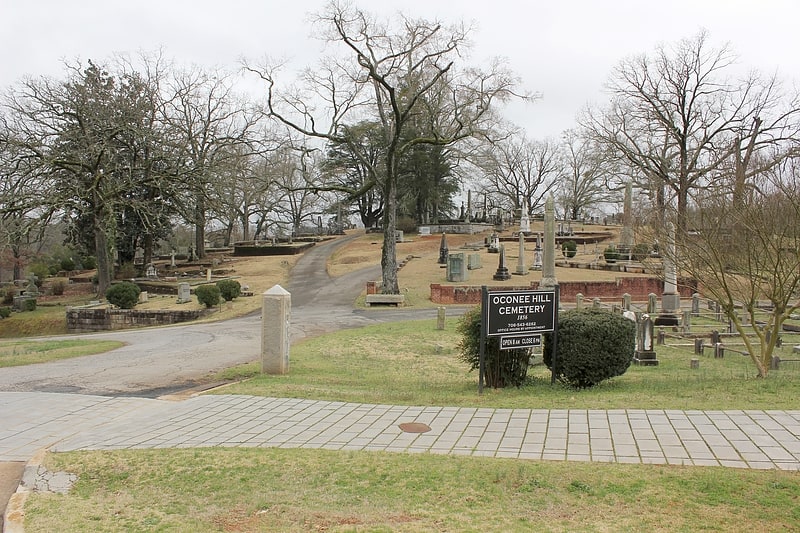
Cemetery in Athens, Georgia. Oconee Hill Cemetery is a cemetery in Athens, Georgia, United States. The extant cemetery opened in 1856 and is located near the University of Georgia.
Oconee Hill Cemetery was purchased in 1855 by the city of Athens when further burials were prohibited in the old town cemetery on land owned by the University of Georgia. In 1856, the city formed a self-perpetuating Board of Trustees to hold and manage in trust the original purchase of 17 acres (69,000 m2) on the west side of the North Oconee River as a public cemetery for the benefit of the town.
On May 22, 2013, it was added to the National Register of Historic Places.[12]
Dudley Park
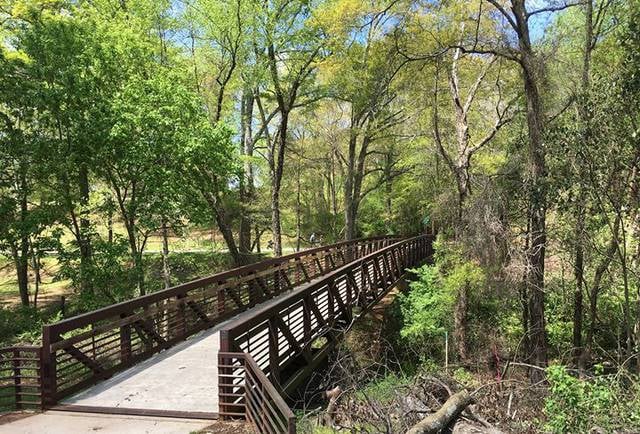
Park, Relax in park
Address: 1177 E Broad St., 30601 Athens
Lucy Cobb Institute
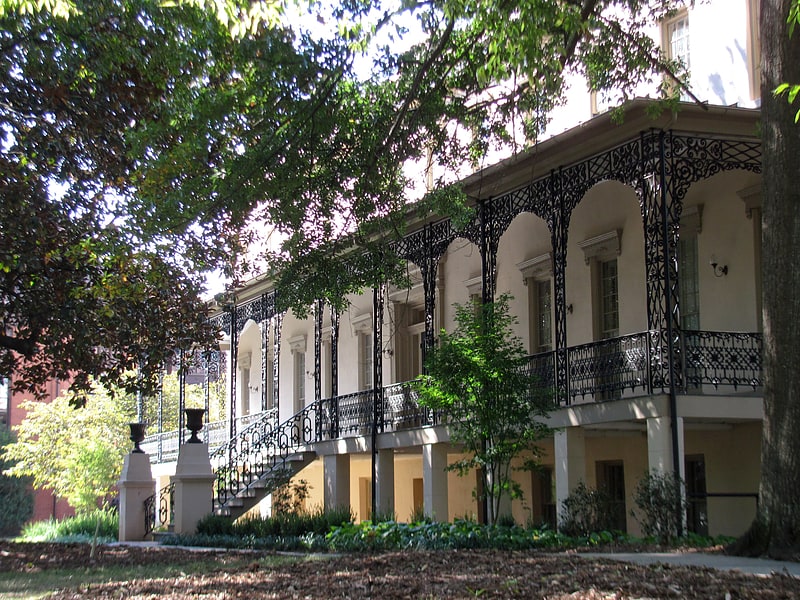
School in Athens. The Lucy Cobb Institute was a girls' school on Milledge Avenue in Athens, Georgia, United States. It was founded by Thomas R.R. Cobb, and named in honor of his daughter, who had died of scarlet fever at age 14, shortly before construction was completed and doors opened; it was incorporated in 1859. The cornerstone for the Seney-Stovall Chapel was laid in May 1882, and the octagonal building was dedicated in 1885. The school closed in 1931.
The campus of the Lucy Cobb Institute was listed on the National Register of Historic Places on March 16, 1972. Today, the Carl Vinson Institute of Government of the University of Georgia is housed in the former Lucy Cobb Institute.[13]
Address: 201 N Milledge Ave, 30602-5027 Athens